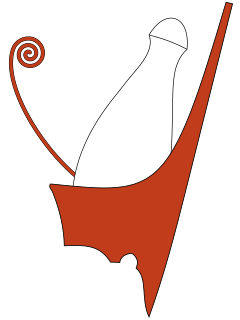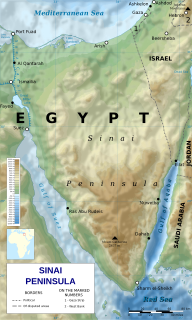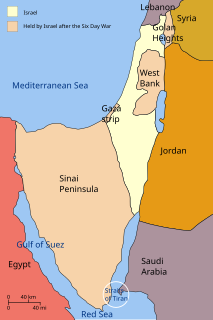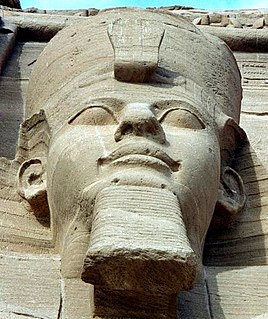
Ancient Egypt was a civilization of ancient North Africa, concentrated along the lower reaches of the Nile River in the place that is now the country Egypt. Ancient Egyptian civilization followed prehistoric Egypt and coalesced around 3100 BC with the political unification of Upper and Lower Egypt under Menes. The history of ancient Egypt occurred as a series of stable kingdoms, separated by periods of relative instability known as Intermediate Periods: the Old Kingdom of the Early Bronze Age, the Middle Kingdom of the Middle Bronze Age and the New Kingdom of the Late Bronze Age.

Alexandria is the second-largest city in Egypt and a major economic centre, extending about 32 km (20 mi) along the coast of the Mediterranean Sea in the north central part of the country. Its low elevation on the Nile delta makes it highly vulnerable to rising sea levels. Alexandria is an important industrial center because of its natural gas and oil pipelines from Suez. Alexandria is also a popular tourist destination.

The Coptic Orthodox Church of Alexandria is an Oriental Orthodox Christian church based in Egypt, Africa and the Middle East. The head of the Church and the See of Alexandria is the Patriarch of Alexandria on the Holy See of Saint Mark, who also carries the title of Coptic Pope. The See of Alexandria is titular, and today the Coptic Pope presides from Saint Mark's Coptic Orthodox Cathedral in the Abbassia District in Cairo. The church follows the Alexandrian Rite for its liturgy, prayer and devotional patrimony. With 18–22 million members worldwide, whereof about 15 to 20 million are in Egypt, it is the country's largest Christian church.

Pharaoh is the common title of the monarchs of ancient Egypt from the First Dynasty until the annexation of Egypt by the Roman Empire in 30 BCE, although the actual term "Pharaoh" was not used contemporaneously for a ruler until Merneptah, c. 1200 BCE. In the early dynasty, ancient Egyptian kings used to have up to three titles, the Horus, the Sedge and Bee (nswt-bjtj) name, and the Two Ladies (nbtj) name. The Golden Horus and nomen and prenomen titles were later added.

The Sinai Peninsula or simply Sinai is a peninsula in Egypt, and the only part of the country located in Asia. It is situated between the Mediterranean Sea to the north and the Red Sea to the south, and is a land bridge between Asia and Africa. Sinai has a land area of about 60,000 km2 (23,000 sq mi) and a population of approximately 1,400,000 people. Administratively, the Sinai Peninsula is divided into two governorates: the South Sinai Governorate and the North Sinai Governorate. Three other governorates span the Suez Canal, crossing into African Egypt: Suez Governorate on the southern end of the Suez Canal, Ismailia Governorate in the center, and Port Said Governorate in the north.

The Six-Day War, also known as the June War, 1967 Arab–Israeli War, or Third Arab–Israeli War, was fought between 5 and 10 June 1967 by Israel and the neighboring states of Egypt, Jordan, and Syria.

The Yom Kippur War, Ramadan War, or October War, also known as the 1973 Arab–Israeli War, was a war fought from October 6 to 25, 1973, by a coalition of Arab states led by Egypt and Syria against Israel. The war took place mostly in Sinai and the Golan—occupied by Israel during the 1967 Six-Day War—with some fighting in African Egypt and northern Israel. Egypt's initial war objective was to use its military to seize a foothold on the east bank of the Suez Canal and use this to negotiate the return of the rest of Sinai.

Horus is one of the most significant ancient Egyptian deities. He was worshipped from at least the late prehistoric Egypt until the Ptolemaic Kingdom and Roman Egypt. Different forms of Horus are recorded in history and these are treated as distinct gods by Egyptologists. These various forms may possibly be different manifestations of the same multi-layered deity in which certain attributes or syncretic relationships are emphasized, not necessarily in opposition but complementary to one another, consistent with how the Ancient Egyptians viewed the multiple facets of reality. He was most often depicted as a falcon, most likely a lanner falcon or peregrine falcon, or as a man with a falcon head.

Muhammad Anwar el-Sadat was the third President of Egypt, serving from 15 October 1970 until his assassination by fundamentalist army officers on 6 October 1981. Sadat was a senior member of the Free Officers who overthrew King Farouk in the Egyptian Revolution of 1952, and a close confidant of President Gamal Abdel Nasser, under whom he served as Vice President twice and whom he succeeded as President in 1970.

Egyptian hieroglyphs were the formal writing system used in Ancient Egypt. Hieroglyphs combined logographic, syllabic and alphabetic elements, with a total of some 1,000 distinct characters. Cursive hieroglyphs were used for religious literature on papyrus and wood. The later hieratic and demotic Egyptian scripts were derived from hieroglyphic writing, as was the Proto-Siniatic script that later evolved into the Phoenician alphabet. Through the Phoenician alphabet's major child systems, the Greek and Aramaic scripts, the Egyptian hieroglyphic script is ancestral to the majority of scripts in modern use, most prominently the Latin and Cyrillic scripts and the Arabic script and Brahmic family of scripts.

Muhammad Hosni El Sayed Mubarak is a former Egyptian military and political leader who served as the fourth President of Egypt from 1981 to 2011.

The Suez Crisis, or the Second Arab–Israeli War, also named the Tripartite Aggression in the Arab world and Operation Kadesh or Sinai War in Israel, was an invasion of Egypt in late 1956 by Israel, followed by the United Kingdom and France. The aims were to regain Western control of the Suez Canal and to remove Egyptian President Gamal Abdel Nasser, who had just nationalized the canal. After the fighting had started, political pressure from the United States, the Soviet Union and the United Nations led to a withdrawal by the three invaders. The episode humiliated the United Kingdom and France and strengthened Nasser.

Thoth is one of the ancient Egyptian deities. In art, he was often depicted as a man with the head of an ibis or a baboon, animals sacred to him. His feminine counterpart was Seshat, and his wife was Ma'at.

The Egyptian pyramids are ancient pyramid-shaped masonry structures located in Egypt. As of November 2008, sources cite either 118 or 138 as the number of identified Egyptian pyramids. Most were built as tombs for the country's pharaohs and their consorts during the Old and Middle Kingdom periods.

The Egypt national football team, known colloquially as The Pharaohs, represents Egypt in men's International association football and is governed by the Egyptian Football Association (EFA) founded in 1921, the governing body for football in Egypt. The team's historical stadium is Cairo International Stadium but since 2012 the team has played most home games at Borg El Arab Stadium in Alexandria. Between 1958 and 1961, the team combined with Syria to form the United Arab Republic national football team, although the team's records are attributed only to Egypt by FIFA.

Ramesses II, also known as Ramesses the Great, was the third pharaoh of the Nineteenth Dynasty of Egypt. He is often regarded as the greatest, most celebrated, and most powerful pharaoh of the New Kingdom. His successors and later Egyptians called him the "Great Ancestor".
Egyptians are an ethnic group native to Egypt and the citizens of that country sharing a common culture and a common dialect known as Egyptian Arabic.

Mohamed Salah Hamed Mahrous Ghaly is an Egyptian professional footballer who plays as a forward for Premier League club Liverpool and the Egypt national team. He is considered Europe's top five leagues' fifth most expensive player from a transfer value perspective by the CIES.

Abdel Fattah Saeed Hussein Khalil El-Sisi is an Egyptian politician who is the sixth and current President of Egypt, in office since 2014. Starting February 10, 2019, Sisi also began serving a one-year term as Chairperson of the African Union.




















